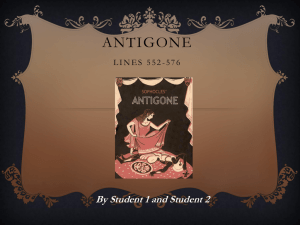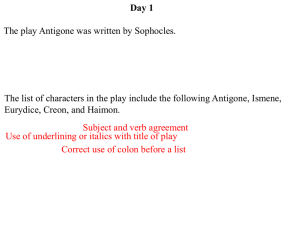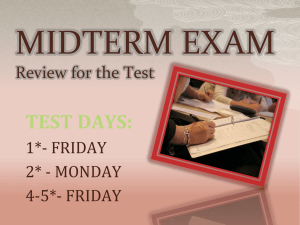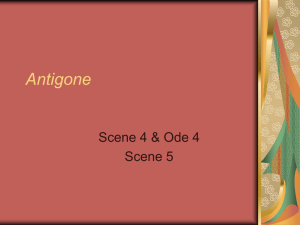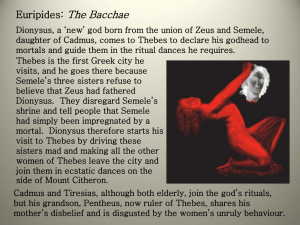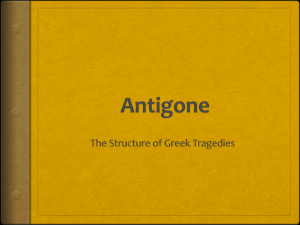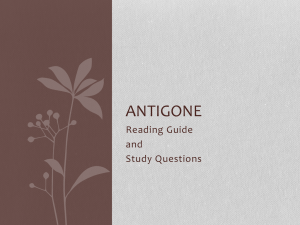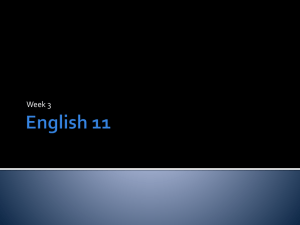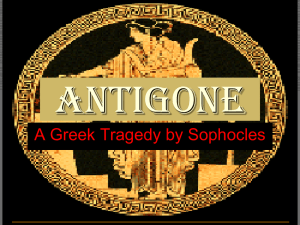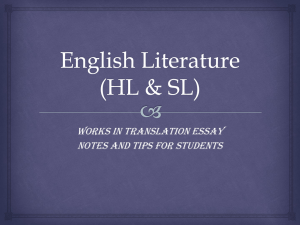Responding to Short Essay Questions
advertisement
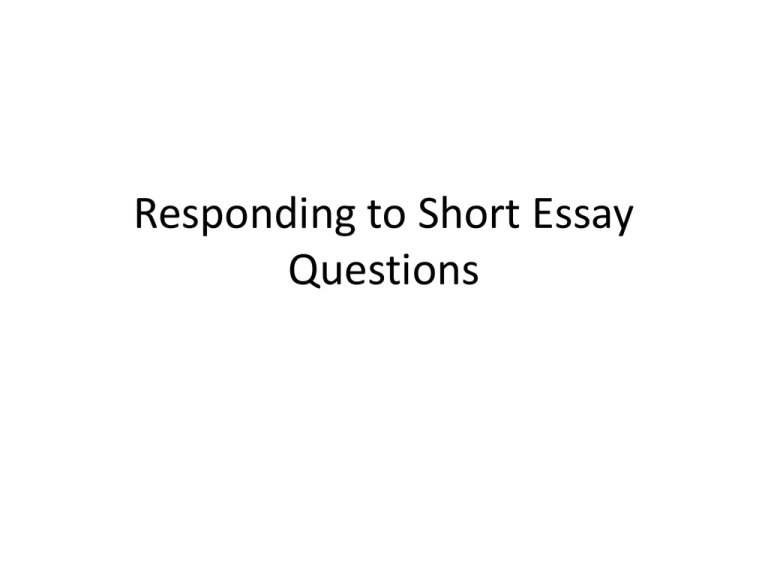
Responding to Short Essay Questions Responding to a Prompt 1. Identify the question 2. Restate the question as a thesis- the point that you wish to prove. 3. Give 3 specific examples directly related to the question. 4. Explain how those examples prove your point. 5. Summarize your point by rephrasing (not repeating) your thesis. Essay Response PROMPT #1 Antigone declares that she acts out of honor and obedience to the gods. Are these really her motives? Do her words and actions reveal other motives? In an essay, analyze Antigone’s motives and draw conclusions about why she does what she does. Use at least three details from the play to support your analysis. Step One: Find the Question PROMPT #1 Antigone declares that she acts out of honor and obedience to the gods. Are these really her motives? Do her words and actions reveal other motives? In an essay, analyze Antigone’s motives and draw conclusions about why she does what she does. Use at least three details from the play to support your analysis. Step Two: Restate the question as a thesis • Antigone declares that she acts out of honor and obedience to the gods. Are these really her motives? Do her words and actions reveal other motives? Although Antigone claims that she acts out of honor and obedience to the gods, these are not her real motives. Her words and actions reveal other motives. Step Three: Give three specific examples • She wants to honor the brother that she has lost. • She wants to get credit for burying Polyneices. • She wants to die. Good Response Although Antigone claims that she acts out of honor and obedience to the gods, these are not her real motives. Her words and actions reveal other motives. Firstly, Antigone feels responsible for burying her brother. In the prologue, she argues with Ismene that they have a family obligation. She says “He is my brother. And he is your brother, too” Another reason she does this is to get credit for it. She tells Ismene to tell everyone. This suggests a sense of pride. Finally, she seems to have a death wish. Not only does Antigone want everyone to know what she did, before she dies, she seems happy to be able to see her dead mother, father and brother. Therefore, Antigone’ has many more motivations for this than just reverence for the gods. Reason One Although Antigone claims that she acts out of honor and obedience to the gods, these are not her real motives. Her words and actions reveal other motives. Firstly, Antigone feels responsible for burying her brother. In the prologue, she argues with Ismene that they have a family obligation. She says “He is my brother. And he is your brother, too” Another reason she does this is to get credit for it. She tells Ismene to tell everyone. This suggests a sense of pride. Finally, she seems to have a death wish. Not only does Antigone want everyone to know what she did, before she dies, she seems happy to be able to see her dead mother, father and brother. Therefore, Antigone’ has many more motivations than just reverence for the gods. Reason Two Although Antigone claims that she acts out of honor and obedience to the gods, these are not her real motives. Her words and actions reveal other motives. Firstly, Antigone feels responsible for burying her brother. In the prologue, she argues with Ismene that they have a family obligation. She says “He is my brother. And he is your brother, too” Another reason she does this is to get credit for it. She tells Ismene to tell everyone. This suggests a sense of pride. Finally, she seems to have a death wish. Not only does Antigone want everyone to know what she did, before she dies, she seems happy to be able to see her dead mother, father and brother. Therefore, Antigone’ has many more motivations than just reverence for the gods. Reason Three Although Antigone claims that she acts out of honor and obedience to the gods, these are not her real motives. Her words and actions reveal other motives. Firstly, Antigone feels responsible for burying her brother. In the prologue, she argues with Ismene that they have an family obligation. She says “He is my brother. And he is your brother, too” Another reason she does this is to get credit for it. She tells Ismene to tell everyone. This suggests a sense of pride. Finally, she seems to have a death wish. Not only does Antigone want everyone to know what she did, before she dies, she seems happy to be able to see her dead mother, father and brother. Therefore, Antigone’ has many more motivations than just reverence for the gods. Transitions Although Antigone claims that she acts out of honor and obedience to the gods, these are not her real motives. Her words and actions reveal other motives. Firstly, Antigone feels responsible for burying her brother. In the prologue, she argues with Ismene that they have a family obligation. She says “He is my brother. And he is your brother, too” Another reason she does this is to get credit for it. She tells Ismene to tell everyone. This suggests a sense of pride. Finally, she seems to have a death wish. Not only does Antigone want everyone to know what she did, before she dies, she seems happy to be able to see her dead mother, father and brother. Therefore, Antigone’ has many more motivations than just reverence for the gods. Essay Response PROMPT #2 As the new head of state, Creon forbids Polyneices’ burial. In an essay, investigate the character of Creon. What do his decision and the reasons for his decision say about him? What are the strengths and the weaknesses of his character? Use at least three details from the play to support your investigation of Creon’s character. Step One: Find the Question PROMPT #2 As the new head of state, Creon forbids Polyneices’ burial. In an essay, investigate the character of Creon. What do his decision and the reasons for his decision say about him? What are the strengths and the weaknesses of his character? Use at least three details from the play to support your investigation of Creon’s character. Step Two: Write a Thesis • As the new head of state, Creon forbids Polyneices’ burial. In an essay, investigate the character of Creon. What do his decision and the reasons for his decision say about him? What are the strengths and the weaknesses of his character? Creon’s decision and the reasons for this choice say much about him and reveal both his strengths and weaknessess. Essay Response PROMPT #3 In your opinion, what accounts for the strong appeal Antigone has had for centuries? In a short essay, explain why Sophocles’ classic tragedy remains relevant to modern life. Support your opinion with at least three details from the play. Step One PROMPT #3 In your opinion, what accounts for the strong appeal Antigone has had for centuries? In a short essay, explain why Sophocles’ classic tragedy remains relevant to modern life. Support your opinion with at least three details from the play. Essay Response PROMPT #4 With which character in Antigone did you identify most strongly? In a short essay, explain how and why you identified with this character. Discuss what you discovered about the character and the play. Use at least three details from the play to support your explanation. Essay Response PROMPT #5 Who do you believe is the tragic hero in Antigone—Antigone or Creon? In a short essay, state your opinion and support it with reasonable evidence from the play. Use at least three details from the play to support your opinion.
